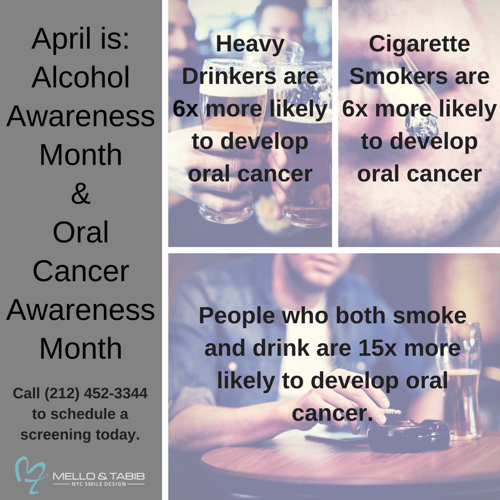Search for topics or resources
Enter your search below and hit enter or click the search icon.

April is Alcohol Awareness Month, giving us an opportunity to really reflect on the impact alcohol has on oral health.
Alcohol threatens oral health on two fronts: enamel erosion and risks for oral cancer. Alcohol causes dehydration, which reduces saliva production. Without proper saliva production, the acids in alcohol are less likely to be quickly removed from the teeth. This leads to enamel erosion and increases risks for sensitivity, infection, and decay. Enamel erosion will also lead to a yellowing of the teeth as underlying dentin is exposed.

According to the American Cancer Society, alcohol contributes to oral cancer risks along with risks of cancer in the throat, voice box, and esophagus. These risks are much greater for men and women who smoke in addition to drinking heavily.
Smokers are six-times more likely to develop oral cancer as nonsmokers. Those who drink alcohol but do not smoke have the same increase in oral cancer risks. For people who both smoke and drink, the oral cancer risk is 15-times higher.
It should be noted that users of smokeless tobacco are 50-times more likely to develop oral cancer, even without the consumption of alcohol.
In addition to being Alcohol Awareness Month, April is Oral Cancer Awareness Month, giving us a chance to reflect on the relationship between these two things. The Oral Cancer Foundation (OCF) reports that an average of 9,750 deaths are caused by oral cancer each year. That’s more than one death per hour, every day, to this disease. According to the OCF, out of the estimated 47,500 new cases of oral cancer in the United States this year, only 57% of patients will still be alive in five.
Oral cancer is a killer. This is made more tragic by the fact that it is also, in many cases, entirely avoidable.
The Mouth Cancer Foundation has called oral cancer a “lifestyle disease,” defining it as one primarily related to personal choices such as the consumption of alcohol and tobacco. But there is no need to despair. These risks are diminished significantly when a person gives tobacco up.
The damage done to teeth by alcohol can be mitigated by maintaining a healthy and consistent oral health routine. If you drink, make sure to brush your teeth more frequently, especially after imbibing. But do wait for at least 30-minutes before brushing to help avoid removing softened enamel.
Drinking water while you drink alcohol can also help reduce risks to enamel, as can drinking alcohol through a straw so it avoids the surface of teeth entirely. You can further reduce damage by choosing a toothpaste designed for enamel erosion. We offer Remin Pro® at our Manhattan office. This toothpaste is specifically designed for teeth that have lost enamel due to acid erosion.
For teeth that have become yellowed, either through tobacco use or enamel erosion, we offer porcelain veneers, dental bonding, and dental crowns that can help restore luster while preventing future damage and adding needed strength to the teeth. During your initial consultation, we can discuss all of these options with you in detail to help you choose the best one for your needs.
At NYC Smile Design, we are committed to the health and happiness of all of our patients. Please call our office at 212-452-3344 to schedule an appointment and learn more. Located in Manhattan, we welcome patients from all surrounding areas of New York, New Jersey, and Connecticut.
Topics: